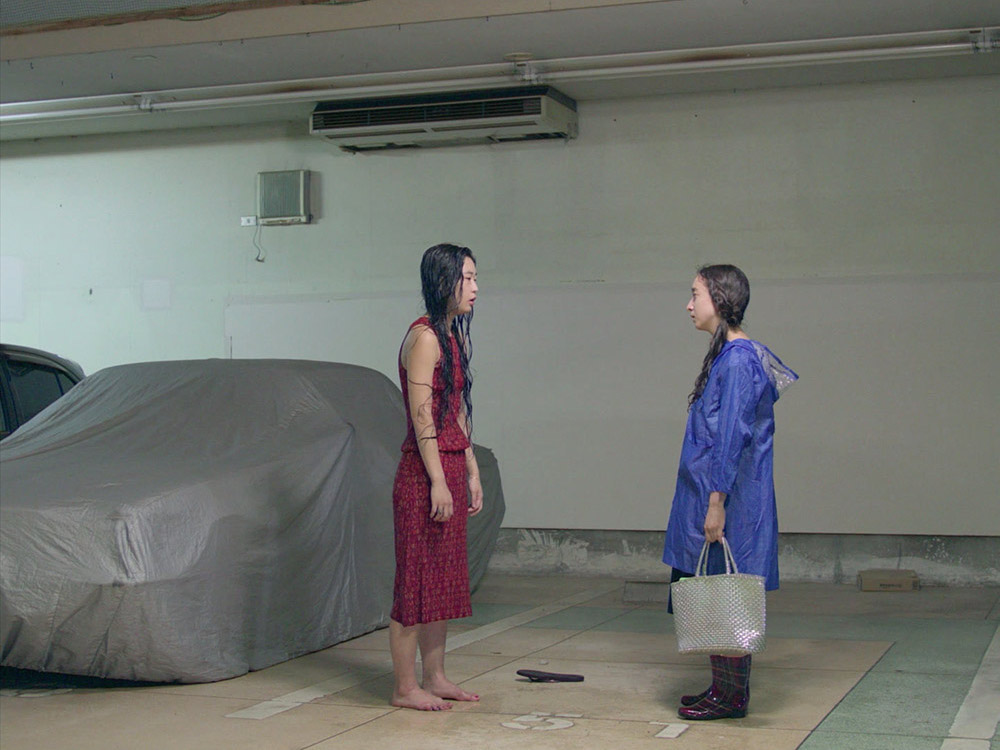
Four young people fascinated by the book N.P meet over the summer in Japan. They all share a connection or history with this collection of autobiographical stories written by the late Sarao Takase. The film uses their complex web of relationships to reflect on how a translation relates to its original, fiction to reality; and on their often incestuous interaction.
“As a teen, Lisa Spilliaert fell in love with Banana Yoshimoto’s 1990 novel N.P and developed a plan to make a film adaptation over many years. The resulting film grapples with the complexities of moving from the written page to cinematic time and space. N.P is a silent film, though not in the traditional sense. While the sound of dialogue is erased – and rendered into captions – all the other sound is present, from room tone to the clinking of plates in a restaurant, from the chirping of birds to the quiet roar of sea waves. Beyond dialogue, narration is delivered as visual text via intertitles. These devices lend the film a dreamy, otherworldly quality befitting its enigmatic, unpredictable and at times violent action. (...) It takes courage and self-assuredness to approach such a monumental work of literature for a first feature, but through her film, Spilliaert is able to effectively convey the complexities and contradictions of these delicately fleshed out characters.”
Herb Shellenberger1
Lisa Spilliaert: Sound concept was done by Vincent Stroep, who is also one of the producers, and with a sound studio in Antwerp. One important decision was that the voices are stolen. Only the voices are taken away, mostly in the dialogue parts. You hear all the sounds, but only the voices are taken out. So environmental sounds together with foley, because we didn’t record any sounds during the shoots, so we had to reconstruct all of this. They had a foley studio that was so wonderful. And very important are the musicians who contributed the new pieces. Asuna, the Japanese sound artist who did the more subtle tones, then you have Wolf Eyes (...) and the Antwerp musician Stacks.
Herb Shellenberger: Considering that the book itself is so focused on translation, how did you discover this quite, interesting, formal way to move into translating the story and texts into a film?
Spilliaert: We knew already that it would be a silent film. It was in the post-production that we really concentrated ourselves on the text with the dramaturge, Sis Matthé, he had different language versions as references. Because I have the Japanese original version in my mind. We had to come to the very final product in English. And Banana, she recommended us to read the Italian translation. And so Sis the dramaturg, he read the Italian translation, as well as I think, many, many versions of translated N.P. And in conversation with Sis, we tried to make them actually reconstruct the story. Then we really had the feeling to entering the deep forest of translation. But it was very interesting process to see the parting from so many different translations to how my feelings are in the story.
Interview with Lisa Spilliaert2
Nathan Letoré: You chose to film N.P in long, mostly static shots, eschewing classical editing. Could you comment on this choice?
Spilliaert: With great support and contributions from the camera crew I could focus on composition during the shoot. My background in photography may be one of the reasons I often used static framing. Through years of reading the book N.P countless times I developed a detailed imagination for each of the scenes, which made it evident for me how to construct and depict the story. For the travelling shots I put my trust in Hiroshi Ashikaga who was handling the camera. Those shots bring minimal yet crucial vividness in the narrative.
Interview with Lisa Spilliaert3
“Extensively borrowing from melodrama and an aesthetics of photographic novels, Lisa Spilliart skillfully surfs between genres, offering us a surprisingly unique film endowed with such grace and where, so it seems, she has successfully, and discreetly, integrated much of her own self.”
Jean-Pierre Rehm4
- 1Herb Shellenberger, “N.P,” Berwick Film & Media Arts Festival (BFMAF), September 17, 2020.
- 2Herb Shellenberger, “Lisa Spilliaert in Conversation,” Podcast Berwick Film & Media Arts Festival (BFMAF), Episode 5, September 17, 2020.
- 3Nathan Letoré, “Interview with Lisa Spilliaert - N.P,” FIDMarseille, July 24, 2020.
- 4Jean-Pierre Rehm, “N.P,” FIDMarseille, July 24, 2020.

